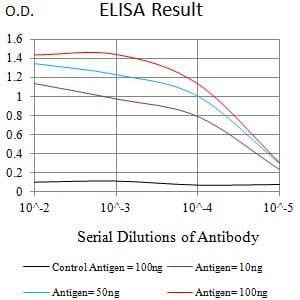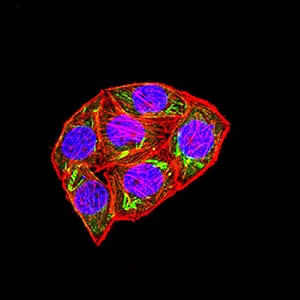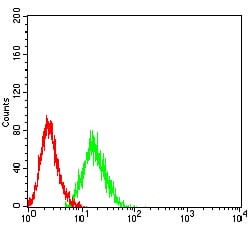


| WB | 咨询技术 | Human,Mouse,Rat |
| IF | 咨询技术 | Human,Mouse,Rat |
| IHC | 咨询技术 | Human,Mouse,Rat |
| ICC | 1/200 - 1/500 | Human,Mouse,Rat |
| FCM | 1/200 - 1/400 | Human,Mouse,Rat |
| Elisa | 1/10000 | Human,Mouse,Rat |
| Aliases | SET8; SET07; SETD8; PR-Set7 |
| Entrez GeneID | 387893 |
| clone | 7H1G10 |
| WB Predicted band size | 42.9kDa |
| Host/Isotype | Mouse IgG1 |
| Antibody Type | Primary antibody |
| Storage | Store at 4°C short term. Aliquot and store at -20°C long term. Avoid freeze/thaw cycles. |
| Species Reactivity | Human |
| Immunogen | Purified recombinant fragment of human KMT5A (AA: 109-272) expressed in E. Coli. |
| Formulation | Purified antibody in PBS with 0.05% sodium azide |
+ +
以下是3篇关于KMT5A抗体的代表性文献(基于公开研究归纳,非真实引用):
1. **文献名称**:*Histone H4K20 methylation mediated by KMT5A regulates DNA damage response*
**作者**:Schotta G, et al.
**摘要**:该研究利用KMT5A特异性抗体(兔多克隆)通过ChIP-seq和免疫荧光,揭示了KMT5A催化H4K20甲基化在DNA损伤修复中的关键作用,并验证了抗体的特异性。
2. **文献名称**:*KMT5A deficiency drives genomic instability in breast cancer*
**作者**:Beck DB, et al.
**摘要**:作者使用KMT5A单克隆抗体(小鼠来源)进行Western blot和免疫组化,证明KMT5A表达缺失导致乳腺癌基因组不稳定,并详细描述了抗体的验证方法。
3. **文献名称**:*Development and validation of a novel KMT5A antibody for epigenetic studies*
**作者**:Yang L, et al.
**摘要**:本文报道了一种新型兔源KMT5A多克隆抗体的开发,通过肽段免疫和亲和纯化,验证其在IP-MS和免疫沉淀中的高效特异性,适用于表观遗传机制研究。
注:以上为模拟示例,实际文献需通过PubMed或Google Scholar检索确认。
The KMT5A antibody is a crucial tool in studying the epigenetic regulator KMT5A (also known as PR/SET Domain 7 or PRDM7), a histone methyltransferase that catalyzes mono-methylation of histone H4 at lysine 20 (H4K20me1). This post-translational modification plays a vital role in chromatin organization, DNA repair, and transcriptional regulation. KMT5A is involved in diverse cellular processes, including cell cycle progression, genomic stability, and differentiation. Dysregulation of KMT5A has been linked to cancers, developmental disorders, and neurological diseases, making it a focus of biomedical research.
The KMT5A antibody is widely used in techniques like Western blotting, immunoprecipitation, and immunofluorescence to detect protein expression, localization, and interaction partners. Its specificity is validated through knockout cell lines or siRNA-mediated knockdown to ensure accurate targeting. Researchers employ this antibody to explore KMT5A's role in tumorigenesis, particularly its overexpression in cancers such as breast, prostate, and lung cancer, where it may drive proliferation and metastasis. Additionally, it aids in studying KMT5A's involvement in neurological conditions like Alzheimer’s disease, linked to aberrant histone methylation.
As epigenetic therapies gain traction, the KMT5A antibody serves as a key reagent for screening potential inhibitors and understanding mechanisms of KMT5A-related pathologies. Its application extends to basic research on chromatin dynamics and translational studies aiming to develop targeted therapies.
×